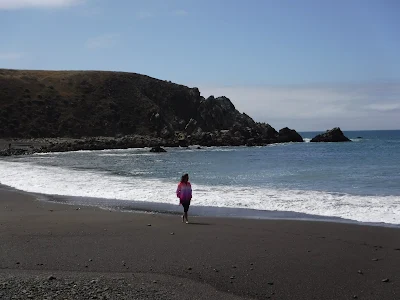Cruising the Time Machine – Part One: Fort Ross
 |
| Our keyboards don't have those letters - is it really Russian? |
Fort Ross is an easy drive along the narrow and
dangerously breathtaking Highway 1, approximately 8o miles north of San
Francisco. The passengers will have a great time staring down at some of the
most majestic and beautiful coastline in the world while the driver will get
blurry eyed gauging the roadway and wondering if the whiteness in his or her
knuckles will ever go away.
 |
| Nice setting for a Russian Fort on American soil |
The Russian-American Company (RAC) whose main function it was to collect seal and otter furs, built the fort in 1812 and carried on business there until 1841 when the decline for such furry clothing made it non-profitable. Bad for the RAC but good for the little creatures of the Northern California coastline. A secondary priority was growing food for the employees of RAC who were stationed in Alaska – this too turned out not to be good as the growing season was rather short and the amount of gophers in the farmland proved too much bother to deal with.
 |
| Looking north from Fort Ross - nice view |
J and L took a short four day cruise up the northern
coast of California in their RV though it should be noted here that it is not
recommended to drive such large vehicles on the winding stretches of asphalt.
But since the drive and scenery is a must, just tow a smaller vehicle if a RV
is the mode of travel. Our rendition of the ‘Herbie the love bug’ is our go-to
transportation for daily excursions away from the RV. Light-weight, funky
looking, and fun to drive.
 |
| John pointing - always looks good in photos |
 |
| Now that's a Russian design |
The rather large wooden fort was built on an ancient
Kashaya Village site and is considered one of the truly first International
communities in North America (some of the Russians married the local natives
which were then referred to as Creoles). Located on the Spanish Frontier and occupied
by Russians, Native Alaskans, Kashaya, Miwok and Pomo Indians living together
as one large ‘family.’ Almost equal number of males and females made up the
population which was documented by Father Ioann Veniaminov who conducted a
census of the community in 1836: 260 residents made up of 154 male to 106
female (120 Russians, 50 Kodiak Aleuts and 39 various other local natives as
mentioned above). Besides the regular inhabitants, the fort was also the
destination for dignitaries and businessmen from around the world – United
States, Europe and Mexico. At this time
the Russian Empire and the Chinese Empire did not get along too well so the
Americans were used as go-betweens to sell the fur to China which was the
highest market for the little furry creatures. Because of the location of Fort
Ross deals were made with the Hawaiian King Kamehameha during that time period
making this a true community of diverse cultures. In fact, the people got along so well that the
Pomo baskets which are some of the sturdiest and decorative native handicrafts
from the area were so admired by the Russians that the largest collection in the
world is in Russia today.
Then again, the baskets are pretty nice.
The fort is also known the place to be where the first
windmill to grind grain was built in California – this is a locale where firsts
just keep coming.
 |
| Explorers on the explore |
After the fort was abandoned and everything sold off
by the RAC, the area became farm land, grazing land and even a stage stop for
those folks traveling the coast of California.
In 1906 the grounds were designated a state park and
is one of the oldest in the entire state of California. As any park – this one
is visited by thousands of people from around the world who want to take a step
back in time with a keen eye to research and exploration – that is something J
and L want all travelers to do.
Sort of like a time machine just without all the
handles, gizmos and electricity buzzing around. Highway 1 is enough of a
thrill.
 |
| Laureen walking the beach with a jacket in July |
On a side note J and L bumped into a young man by the
name of Brian who is doing something pretty awesome this summer of 2015.
Astride his Harley Davidson, Brian plans on hitting 48 states within a couple
to three months. We chatted him up a few minutes and he even showed us his
route already planned out with pit stops here and pit stops there. He plans to
take paths not always taken by travelers and we nodded in agreement as in all of
our travels the famous poem by Robert Frost which talks about road
less-traveled should, in truth, be the one taken to influence our destinations.
 |
| Brian - on his quest of 48 states in 2 months |
We wish our new friend the best in his road circuit.
 |
| Brian's trusty steed |


No comments:
Post a Comment